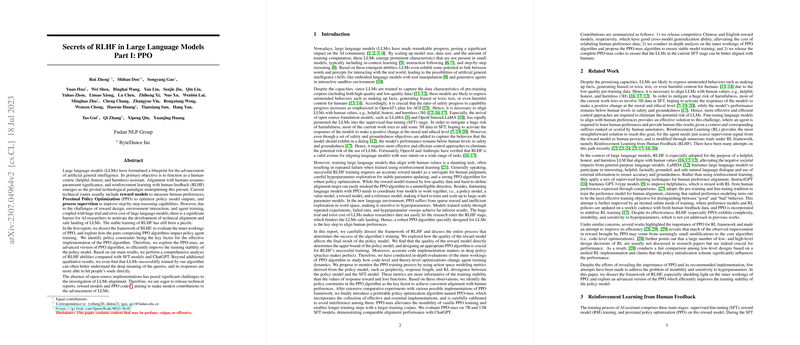Exploring the Mechanics of RLHF and PPO in LLMs
This paper provides a comprehensive exploration of the implementation and implications of Reinforcement Learning from Human Feedback (RLHF) in the context of LLMs, specifically through the lens of Proximal Policy Optimization (PPO). The authors dissect the nuances of PPO, aiming to enhance training stability and achieve effective alignment of LLMs with human expectations.
Contributions and Methodology
The paper addresses the complexity and sensitivity of RLHF, particularly focusing on the PPO algorithm's role in aligning LLMs with human-like capabilities. The researchers approach the task by:
- Dissecting RLHF and PPO Frameworks: They scrutinize the components of PPO that impact the effectiveness of policy agent training, emphasizing that policy constraints are crucial for the successful application of PPO in RLHF contexts.
- Introducing PPO-max: To address stability issues in PPO training, the authors propose an advanced PPO variant, PPO-max. This model incorporates key modifications, enhancing training stability and allowing for longer training sequences with larger datasets, reaching an alignment performance akin to ChatGPT without overfitting.
- Reward Model and Metrics: The authors unveil competitive reward models for both Chinese and English contexts, positioning them as strong surrogates for human judgment. By releasing these models along with the complete PPO-max code, they aim to facilitate broader alignment endeavors in the NLP community.
- Empirical Analysis: The paper contrasts the RLHF-trained models (PPO-max) against supervised fine-tuned (SFT) models and ChatGPT counterparts, revealing improvements in understanding query depth and producing more contextually relevant responses.
Numerical Findings and Evaluation
The researchers report significant alignment gains with human intent when leveraging PPO-max over traditional PPO settings. In comparative assessments, the RLHF models consistently outperform or match SFT models, and, in some respects, hold their ground against the proprietary ChatGPT. Notably, the paper underscores that incorporating pre-training data into PPO-tempered the decline in language understanding capabilities typically observed with PPO-exclusive training.
Through human evaluations and GPT-4 assessments, the models display enhanced harmless and helpful behaviors, crucial for reducing potential harms inherent in LLM outputs. This aligns with OpenAI's safety-to-capability progress ratio emphasis.
Theoretical and Practical Implications
Theoretically, the paper enriches the understanding of PPO in high-dimensional NLP tasks and sheds light on optimizing reinforcement learning strategies in the unique context of LLMs. Practically, it addresses the pressing need for more stable RLHF implementations, which could simplify the transition from model capability to safe deployment.
Furthermore, by releasing the PPO-max framework, the authors bridge a gap in the availability of open-source tools, facilitating wider experimental replication and innovation in aligning AI models with human ethics and values.
Speculations on Future Developments
The insights derived from this paper point to several future research directions:
- Scaling Laws: Investigating how PPO-max and similar techniques scale with increased model sizes and data volumes could refine our adaptive strategies for training even larger LLMs.
- Enhanced Reward Models: Developing more nuanced, high-fidelity reward models will be critical in ensuring alignment models continue to evolve alongside growing societal and ethical expectations.
- PPO Variants and Hybrid Approaches: Exploring new combinations of RLHF paradigms and deepening the integration of supervised techniques with RL could yield novel frameworks that outperform current state-of-the-art methodologies.
In summary, this research significantly pushes the boundaries of RLHF methodologies within LLM architectures, providing a solid foundation for developing safe, reliable, and human-aligned AI assistants. Further research in this domain, especially with open-access tools like PPO-max, is likely to spur innovations that extend AI's capabilities while ensuring ethical and pragmatic deployment.
